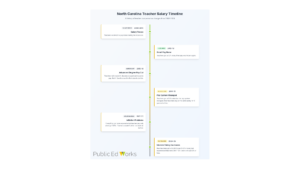By Amy Cockerham
Public Ed Works
RALEIGH (August 20, 2025) – It’s no secret that pay is a concern for North Carolina teachers – the latest report from the National Education Association ranks the state 43rd in the U.S. for average teacher salaries.
It hasn’t always been this way. Based on a table from the American Federation of Teachers, 25 years ago the average teacher salary in 1999-2000 in North Carolina was $39,404, which ranked 22nd in the nation.
Sadly, the state’s rank has dropped about 20 spots over the past 25 years. Adjusting for inflation using the calculator from the U.S. Bureau of Labor Statistics, the pay back then would be equivalent to $75,297 now.
“You’ve got to get people into the profession first, and then you have to respect them and pay them over time,” said Don Martin, former Superintendent of Winston-Salem/Forsyth County Schools.
With pay not keeping up, North Carolina school systems are losing teachers to bordering states.
“Clearly we are not competing in teacher salaries between our Southern states – we are fairly similar in our economics and support and and wealth, but we’re not competing in salaries, our per-pupil spending is low, and our percent of GDP spent for education is not competitive,” Martin said.
“You look at those three pieces of the data and say, ‘Woah, we’re not doing very well.’”
SO HOW’D WE get here?
A history of minimal state pay raises is to blame.
During the recession in 2008, lawmakers froze teacher salaries by disallowing any step increases for the 2009-10 fiscal year.
A 1.2% raise was provided to all teachers in 2012-13 before pay was frozen again in 2013-14. Then in 2013, North Carolina became the first state in the country to remove salary increases for teachers with advanced degrees.
The state’s rank in average teacher pay fell to 47th in 2013-14.
The 2014 budget included funds for an average 5.5% raise for teachers for the 2014-15 school year. This was accompanied by a dramatic restructuring of the salary schedule. Under this schedule, teachers were locked into the same salary for five-year periods.
MORE RECENTLY, inflation has hit Americans hard, and salaries aren’t keeping up with the cost of living.
Between 2021-22 and 2022-23, average salaries increased only 2.63%.
The 2023 state budget allocated some funds to increase salaries in 2024-25. The salary for a first-year teacher increased by $2,000, a 5.13% bump. However, teachers with 7 years to 25+ years of experience received a salary increase of 2% or less.
“The state made a major improvement in beginning teacher salaries several years ago, but they did so at the expense of experienced teachers,” Martin said. “The veteran teachers really felt like they had been pushed aside and not respected with basically a 0% raise for many of them.”
Teachers’ pay comes from a combination of state salary and local supplements that vary by district. However, there’s a significant disparity between wealthy and rural districts.
For example, Graham County Schools pay no supplement, whereas Wake County Schools recruits by paying one of the largest at $11,289.
Gerrelyn Patterson is NC A&T’s Department of Education Preparation Chair. She said the school’s programs have had lower enrollment numbers over the past few years, but numbers are back on the rise after ramping up recruitment efforts.
“That narrative is out there that teachers don’t get paid enough, and there’s been wage stagnation, and we are falling behind other states in terms of the amount that we’re willing to invest in salaries for our teachers,” Patterson said.
She said the financial challenge teachers can face is a reason a lot of people think twice about pursuing the career path.
“Many of our students are on financial aid, and then they’re coming out of college with their degrees, and they have student loan debt,” Patterson said. “Many of our students are looking for a financial pathway that allows them to get their degree, but also fulfills the requirements of repaying any student loans or debts that they may have incurred, while they matriculated through college.”
This year, teachers could be up for pay raises if the NC House budget proposal is approved. Teachers would see an average raise of 8.7% over the next two years. Yet at the same time, the board of the State Health Plan voted this week to increase both premiums and deductibles.
Public school advocates like Martin support the House proposal.
“If I’m in the North Carolina legislature, I want our students to be, you know, number one,” Martin said. “I want us to be competing and be the best in the country.”




Peggy Howell says
We must bring NC teacher pay up compete with other states. Children are our greatest asset, and it’s our job as taxpayers, and adults, to educate them properly.
Bonnie Hauser says
For context, NC ranks 23rd in the nation in cost of living. How is it ok for teachers to rank 43rd
School districts are losing too many experienced teachers to other states.
The House budget is a great start, There’s a long way to go